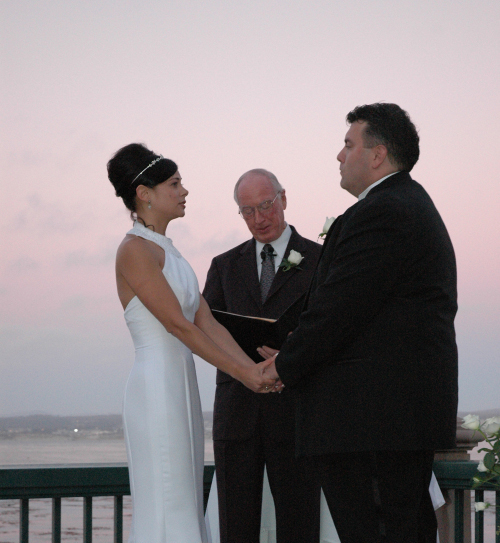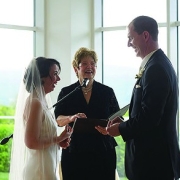What is a wedding officiant?
A wedding officiant is the person who leads your wedding ceremony. They must be legally recognized to do so by the state in which your wedding takes place. If you are having a religious ceremony, your officiant will need to be qualified in the eyes of that religious organization as well. Some religious groups specify where your ceremony must take place as well. For example, the Catholic Church requires that your ceremony take place within the church building.
The legal responsibilities of the officiant vary according to state laws. Generally speaking, your officiant’s signature on your marriage license signifies that he or she knows of no reason that you are not qualified to be married in that particular state. For example, you are of age or have parental consent, you are not currently married to someone else, or seeking a same sex marriage in a state that does not allow them. Their signature also means that they have witnessed you sharing your wedding vows and have officially pronounced that you are partners in marriage in the presence of witnesses (one or two of whom will also be required to sign your license).
In the past, most weddings were conducted either by religious clergy or civil officiants such as judges, justices of the peace, and ship captains. In recent years, it has become popular to have a friend or family member be your wedding officiant. This is accomplished by going on-line to sign up for ministerial credentials with a religious group such as the Universal Life Church that offers them without any requirements of training, dogmatic beliefs, or religious/spiritual practice. Their only requirement is that you ask to be ordained. According to their website http://www.themonastery.org/ordination they have granted over 20 million ordinations to date. On-line ordinations take advantage of the separation of church and state by limiting the legal right of the state to challenge the religious organization’s authority and rules regarding to whom they grant ordination credentials. Some states and local jurisdictions, however, are beginning to challenge the legitimacy of on-line ordinations, so be sure to check out any controversy in the jurisdiction where you plan to be married.
In addition to the legal and religious/spiritual considerations regarding who you choose to have officiate at your wedding, it is important to think about what is and is not important to you about your wedding ceremony. For example, what does it mean to you that you are getting married? Do you need to take into account anyone else’s point of view on the matter? Are you looking for an officiant who you are comfortable with? Do you need someone with enough experience to know how to assist you in your ceremony design, as well as to conduct both the rehearsal and ceremony itself?
Whether you are choosing to have a friend or family member officiate or are looking for a seasoned officiant, be sure to consider how their personality style, personal beliefs, and understanding of their role will influence your ceremony. Typically, your wedding officiant will have the greatest influence in setting the tone of your ceremony, so choose wisely.
Many couples are clueless of where to start to find a qualified wedding officiant. Here are some suggestions:
- Check out regional wedding websites that list wedding-related vendors in their area.
- Ask your wedding venue contact person. Usually, they have a preferred vendor list or will give you personal recommendations based on having worked with certain individuals in the past.
- Ask other vendors such as your photographer or musicians who their favorite officiants are to work with.
- Read reviews and testimonials on the websites of the officiants you are considering or on sites that provide regional listings of vendors.
Above all else, your wedding officiant should be able to serve as your go-to person for all your questions and concerns about your ceremony. Choose someone who can serve you well and help you keep on top of all the details. While your ceremony may last only fifteen to twenty minutes, there are a myriad of big and little details that when handled well can add up to exactly what you wanted, but when overlooked can result in a clumsy and disappointing event.








